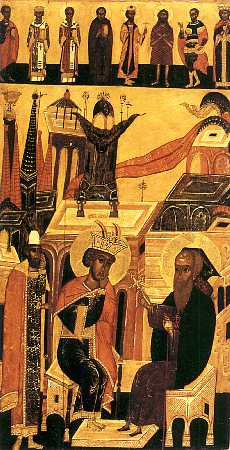
The Monks Varlaam the Wilderness-Dweller, Joasaph the son of the Emperor of India, and his father Avenir
Commemorated on November 19
The Monks Varlaam
the Wilderness-Dweller, Joasaph the son of the Emperor of India, and his father
Avenir: In India, – once formerly having received the Christian faith
through the evangelisation of the holy Apostle Thomas, there ruled the emperor
Avenir, an idol-worshipper and fierce persecutor of Christians. For a long time
he did not have any children. Finally, a son was born to the emperor, and named
Joasaph. At the birth of this son the wisest of the emperor's star-gazers
predicted, that the emperor's son would accept the Christian faith which was
persecuted by his father. The emperor, wanting to ward off the prediction,
commanded that there be built for his son a separate palace and he arranged
matters such, that his son should never hear a single word about Christ and His
teachings.
Reaching a youthful
age, Joasaph asked permission of his father to go out beyond the palace, and he
saw existing there such things as suffering, sickness, old age and death. This
led him into ponderings over the vanity and absurdity of life, and he began to
engage in some serious thinking.
At this time in a
far-off wilderness there asceticised a wise hermit, the Monk Varlaam. By a
Divine insight he learned about the youth agonising in search of truth.
Forsaking his wilderness, the Monk Varlaam in the guise of a merchant set out
to India, and having arrived in the city where Joasaph's palace was situated,
he declared that he had brought with him a precious stone, endowed with
wondrous powers to heal sickness. Being brought in to Joasaph, he began to
present him the Christian faith in the form of parables, and then also
"from the Holy Gospel and the Holy Epistles". From the instructions
of the Monk Varlaam the youth reasoned out, that the precious stone is faith in
the Lord Jesus Christ, and he believed in Him and desired to accept holy
Baptism. Having made the sign of the cross over the youth, the Monk Varlaam bid
him to fast and pray, and he went off into the wilderness.

The emperor, learning
that his son was become a Christian, fell into a rage and grief. On the advice
of one of his counsellors, the emperor arranged for a debate about faith
between the Christians and the pagans, at which under the guise of Varlaam
there appeared the Magi magician Nakhor. In the debate Nakhor was supposed to
acknowledge himself beaten and in such manner turn the imperial youth away from
Christianity. Through a vision in a dream, Saint Joasaph learned about the
deception and he threatened Nakhor with a fiercesome execution, if beaten in
the debate. Nakhor in terror not only beat the pagans, but he himself came to
believe in Christ, and he repented and accepted holy Baptism and went off into
the wilderness. The emperor tried to turn his son away from Christianity by
other methods also, but the youth conquered all the temptations. Then on the
advice of his counsellors, Avenir bestowed on his son half the realm. Saint
Joasaph, having become an emperor, restored Christianity in his lands, built
anew the churches, and finally, he converted his own father the emperor Avenir
to Christianity. Soon after Baptism the emperor Avenir died, and Saint Joasaph
abdicated his rule and went off into the wilderness in search of his teacher,
the elder Varlaam. Over the course of two years he wandered about through the
wilderness, suffering dangers and temptations, until he found the cave of the
Monk Varlaam, asceticising in silence. The elder and the youth began to
asceticise together. When the end for the Monk Varlaam approached, he served
out the Divine Liturgy, partook of the Holy Mysteries and communed Saint
Joasaph, and with this he expired to the Lord, having lived in the wilderness
70 of his hundred years. Having buried the elder, Saint Joasaph remained at the
cave and continued with the wilderness efforts. He dwelt in the wilderness for
35 years, and expired to the Lord at age sixty.
The successor of
Saint Joasaph as emperor, Barachias, with the help of a certain hermit, found
in the cave the undecayed and fragrant relics of both ascetics, and he conveyed
them back to his fatherland and gave them burial in a church, built by the Monk-Emperor
Joasaph.
© 1996-2001 by translator Fr. S. Janos.